I have the following code, but in this line of code I have warning x[i] = (rhs[i] - x[i - 1]) / b;, compiler is telling me that rhs[i] is a garbage value. Why it's happend? And how to remove this warning?
double* getFirstControlPoints(double* rhs, const int n) {
double *x;
x = (double*)malloc(n * sizeof(double));
double *tmp; // Temp workspace.
tmp = (double*)malloc(n * sizeof(double));
double b = 2.0;
x[0] = rhs[0] / b;
for (int i = 1; i < n; i++) // Decomposition and forward substitution.
{
tmp[i] = 1 / b;
b = (i < n - 1 ? 4.0 : 3.5) - tmp[i];
x[i] = (rhs[i] - x[i - 1]) / b; //The left operand of '-' is a garbage value
}
for (int i = 1; i < n; i++) {
x[n - i - 1] -= tmp[n - i] * x[n - i]; // Backsubstitution.
}
free(tmp);
return x;
}


All compiler warnings and calling getFirstControlPoints you may see on screenshots.